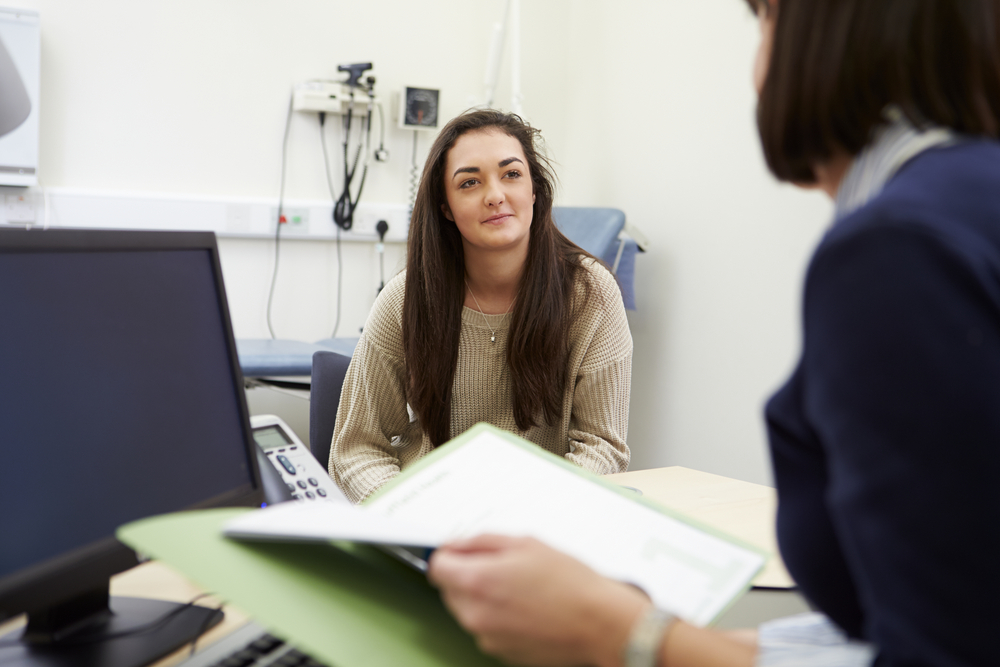Well that’s a little awkward.
There may be no weirder feeling than showing up to your doctor’s office for an annual appointment and answering a slew of unexpected questions about your personal life for the first time. As you grow up and start to outgrow the slide and crayons in the pediatrician’s waiting room, your doctor’s visits begin to change.
Since we all know the unexpected can make us nervous, let’s break down what to expect from your appointments at some of the major milestones along the road to womanhood.
11-13 Years Old
What to Expect
When you’re officially (or super close to officially) a teenager, your pediatrician will add some new questions and check-ins to your regular visit. They will likely talk to you about where you are developmentally.
In addition to checking things you’re used to, like height and weight, your doctor will begin to look for markers of puberty like breast development and growth of underarm and pubic hair. If they haven’t already, your doctor will likely begin testing your blood pressure when you’re in your early teen years, and you will probably begin having conversations with them about things like acne, skin care, body image, stress, sleep, and drugs and alcohol.
These types of visits are often called “well-woman visits,” and continue as you mature. For now, unless you report a particular pain or concern, you won’t have a full vaginal exam, just a quick peek at the outside.
What to Watch For
This stage can feel a little bit like the period waiting game. Most girls have their first period at some point between 10 and 15 years old, and it’s very normal for things to be fairly irregular for a while. You may skip several months or just notice a kind of off-kilter cycle.
To help you feel prepared, you may want to keep pads or tampons handy in your backpack or locker. As your hormone balance changes, you may notice pimples or moodiness; these things are completely normal, but if you’re bothered by them, your doctor can offer some tips. Lots of women find it helpful to keep track of their periods or PMS symptoms on a calendar or app, especially while it’s still a little unpredictable.
What to Ask Your Doctor
If your period gives you cramping or acne that feels severe, your doctor may be able to prescribe birth control or recommend homeopathic remedies to help make your symptoms more manageable. See your doctor if you go through a super tampon or maxi pad in an hour or less, if you have vaginal pain, or if your vagina doesn’t allow for you to insert a tampon.
13-15 Years Old
What to Expect
Your regular visits are likely to include questions about your eating habits and mental health, things your doctor will want to keep track of as your hormones change and as different stressors are introduced into your life. Your doctor will likely begin asking if you’re sexually active and if you smoke or drink alcohol or take drugs.
If you have a parent with you at the appointment, your doctor may ask them to step out of the room for a bit to give you some privacy. It’s important you have a relationship with a physician you feel you can speak honestly with, and that you feel comfortable asking and answering questions openly.
According to the American Congress of Obstetricians and Gynecologists, you should see a gynecologist for the first time at some point between 13 and 15. You may decide you want your pediatrician to perform well-woman exams for a while before you see an OB/GYN; the decision is up to you. If you’re sexually active, it’s a good idea to begin seeing an OB/GYN so you can have a fuller pelvic exam.
What to Watch For
If you’ve had your period for at least a year, it should be becoming more regularly predictable. If you’re choosing a gynecologist, remember to think about who will make you feel the most comfortable. You want to be able to speak candidly and ask your doctor questions without feeling embarrassed. Some girls like to see the OB/GYN their mom visits, while others feel more comfortable having an entirely private relationship.
Familiarize yourself with your body’s “normal,” what you feel like before, during, and just after your period and what your breasts and vagina look and feel like when you are healthy. That way, you’re more likely to notice something out of the ordinary. If you are sexually active in any way, it’s important to watch for symptoms of sexually transmitted diseases.
What to Ask Your Doctor
Around this stage, many women begin developing yeast or urinary tract infections. If you notice painful urination, itchiness, or abnormal discharge, you should get in to see your doctor. These infections are extremely common and easily treatable, but they’re uncomfortable and can be dangerous if they go untreated for a while.
If you think you’ve developed symptoms of an STD, like itchiness, warts, rashes, or bleeding, or if you’ve have unprotected sex, you should make an appointment to be tested. If you’re experiencing sadness, stress, or anxiety that feels like it’s getting in the way of your day-to-day life, your doctor can help you decide if you would benefit from seeing a psychologist or psychiatrist.
16-18 Years Old
What to Expect
Now that you’re likely out of the eye of the pubescent storm, things have probably started to calm down—at least a little. Your menstrual cycle should be mostly regular, and raging hormones are probably mellowing out a little.
You’re likely to still be experiencing some imbalances in your skin, and your doctor can help you decide the best course of action or recommend you see a dermatologist if you might benefit from a specialist’s attention. If you haven’t had the HPV or meningitis vaccines, you’ll probably get them at some point before you graduate from high school, and your doctor may order blood tests to screen for anemia and test your cholesterol levels.
What to Watch For
In the late teen years, sleep and nutrition are especially important. You’re likely to be especially busy with sports and school and clubs and a social life, and you’re probably starting to stay up way later than is actually healthy. You need around nine hours of sleep a night, and habits like midnight Netflix binging or falling asleep with your phone glued to your hand can throw your natural clock out of whack. Lack of sleep can contribute to mood swings and make it harder for you to focus…so your parents are probably right when they tell you to shut off your laptop and hit the hay.
It’s normal for a young woman’s weight to fluctuate some as she matures, but eating proper nutrients is an important way to stay healthy as you grow. Teen women should pay special attention to their calcium and vitamin D intake.
What to Ask Your Doctor
You should see your doctor if you haven’t had your period yet, or if you’ve had it for a while but are still experiencing persistent irregularity. If you have very heavy bleeding, severe cramps, or vomit during your menstrual cycle, it’s worth seeing your pediatrician or gynecologist to determine the cause and to find some relief.
If you’re having significant trouble sleeping, focusing in school, or getting your academic work done on time, your doctor can help you find better time management strategies or may suggest testing. Many teens, even those who aren’t diagnosed with ADD or ADHD, benefit from tutoring or academic accommodations to best help them learn. You have a lot on your plate right now, with SATs and ACTs and college applications. Some stress is normal, but stress that makes it feel particularly difficult to go about your day-to-day routine is worth mentioning to a medical professional.
18-22 Years Old
What to Expect
Depending on your college’s policies, you may require vaccinations or tests (like a tuberculosis screening) before you head off to begin freshman year. If you’ve had symptoms like concerning discharge or vaginal pain, you should have already had a pelvic exam. If not, it’s recommended that you have your first when you turn 21, even if everything seems just fine and you’re not sexually active.
During a pelvic exam, the gynecologist will examine the vulva, use a speculum to open up your vagina and look into your cervix, and may feel your ovaries or uterus to check for irregularities.
Though it definitely sounds invasive, nothing about the exam should actually hurt beyond a feeling of pressure or fullness. Nerves may make your pelvic muscles tighten up, so remember to take deep breaths and to mention any particular worries to your doctor. You may also have a Pap smear (similarly recommended once you turn 21), during which a plastic tool and small brush are used to scrape out cervical cells to screen for abnormalities.
What to Watch For
Many teens decide they’re ready to leave their pediatrician’s office and switch to an internist or general practitioner when they graduate from high school. Your pediatrician may see patients through the college years, in which case it’s completely fine to stay put until you graduate or feel ready to find someone new.
If you’re in the market for a new doc, it’s important to think about what makes you feel the most at ease. It’s also totally normal to shop around a little and meet physicians before you decide on one that feels right for you. During college, it’s important to continue to pay attention to your self-care, like how much sleep and physical activity you’re getting. Living in close quarters makes sicknesses like mono spread like wildfire, so stay away from germy water bottles and stick a Purell bottle in your bag! Schedule an annual appointment with your gynecologist, just like you do with your GP, and call if you notice abnormal discharge, itching, or anything else that feels worrisome.
What to Ask Your Doctor
Mononucleosis, which is extremely common among college students, makes you feel extremely exhausted and has symptoms similar to strep or the flu. If you think you might have it, or if you’ve been in contact with someone who does, visit your campus’ health center and have a blood test.
If you’re sexually active, get tested for STDs (which many colleges do for free) and encourage your partners to do the same. If you live on campus, you may want to have a conversation with your doctor at home about how to get in touch with them while you’re at school, and you should make sure you know how to make an appointment at your college’s health center or at a nearby urgent care.
Once you’re in your twenties and out of college, things progress depending on your stage of life. If and when you start to think about getting pregnant, your gynecologist and general practitioner can both help you begin to assess your fertility and talk about ovulation. Of course, if you become pregnant, your OB/GYN will work with you to provide adequate prenatal care, ensure a healthy pregnancy and delivery, and talk about nursing and postpartum health.
Everyone cringes at the word “speculum” and no one smiles at the idea of sitting through three HPV vaccines, but protection and prevention are important to your health. Backless paper gowns don’t thrill anyone I know, but knowing everything is A-OK is well worth it.




comments